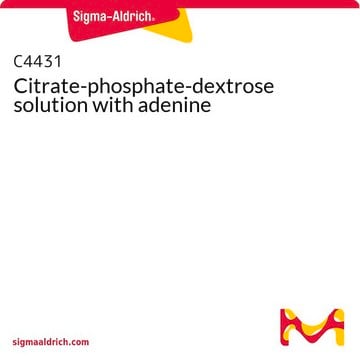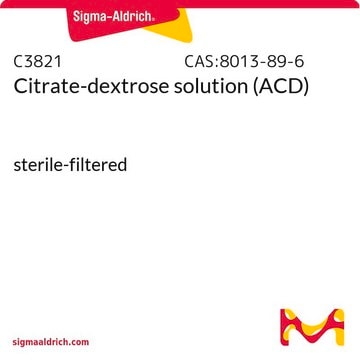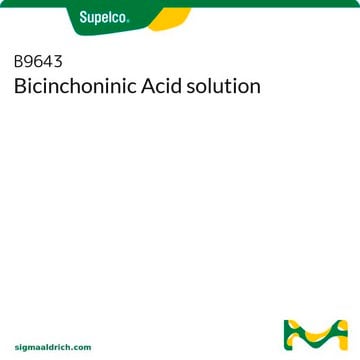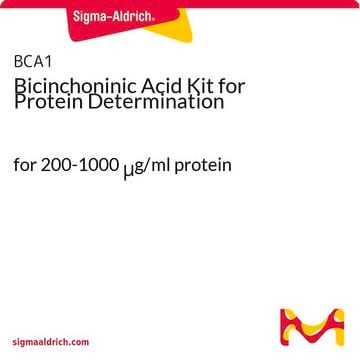C7165
Citrate-phosphate-dextrose solution
aseptically filled
Synonym(s):
Citrate-phosphate-glucose
Sign Into View Organizational & Contract Pricing
All Photos(1)
About This Item
UNSPSC Code:
12161700
NACRES:
NA.25
Recommended Products
General description
Citrate-phosphate-dextrose solution (CPD) is an anticoagulant solution. It has 15% less citrate ion over citrate-phosphate-dextrose solution with adenine (ACD) and provides improved isotonicity, oxygen release function and posttransfusion viability for red blood cells.
Application
Citrate-phosphate-dextrose solution has been used as an anti-coagulant in bovine blood. It has also been used in the storage of fluorescein isothiocyanate (FITC) labeled erythrocytes. Citrate-phosphate-dextrose solution is suitable for erythrocyte survival studies and whole blood storage.
Other Notes
Suggested anticoagulant: whole blood ratio: 1:14
Storage Class Code
10 - Combustible liquids
WGK
WGK 1
Flash Point(F)
Not applicable
Flash Point(C)
Not applicable
Personal Protective Equipment
dust mask type N95 (US), Eyeshields, Gloves
Choose from one of the most recent versions:
Certificates of Analysis (COA)
Lot/Batch Number
Don't see the Right Version?
If you require a particular version, you can look up a specific certificate by the Lot or Batch number.
Already Own This Product?
Find documentation for the products that you have recently purchased in the Document Library.
Customers Also Viewed
Citrate phosphate dextrose (CPD) anticoagulant in blood transfusion
McCullough J and Weiblen BJ
Minnesota Medicine, 56(11), 980-982 (1973)
Noninvasive thrombolysis using histotripsy beyond the intrinsic threshold (microtripsy)
Zhang X, et al.
IEEE Transactions on Ultrasonics, Ferroelectrics, and Frequency Control, 62(7), 1342-1355 (2015)
J J Macoskey et al.
Physics in medicine and biology, 63(5), 055013-055013 (2018-02-10)
Histotripsy is an ultrasonic tissue ablation method based on acoustic cavitation. It has been shown that cavitation dynamics change depending on the mechanical properties of the host medium. During histotripsy treatment, the target-tissue is gradually fractionated and eventually liquefied to
C1-inhibitor reduces hepatic leukocyte-endothelial interaction and the expression of VCAM-1 in LPS-induced sepsis in the rat
Croner RS, et al.
Microvascular Research, 67(2), 182-191 (2004)
Mònica Arman et al.
Malaria journal, 7, 243-243 (2008-11-26)
Platelet-mediated clumping of Plasmodium falciparum-infected erythrocytes (IE) is a parasite adhesion phenotype that has been associated with severe malaria in some, but not all, field isolate studies. A variety of experimental conditions have been used to study clumping in vitro
Our team of scientists has experience in all areas of research including Life Science, Material Science, Chemical Synthesis, Chromatography, Analytical and many others.
Contact Technical Service












